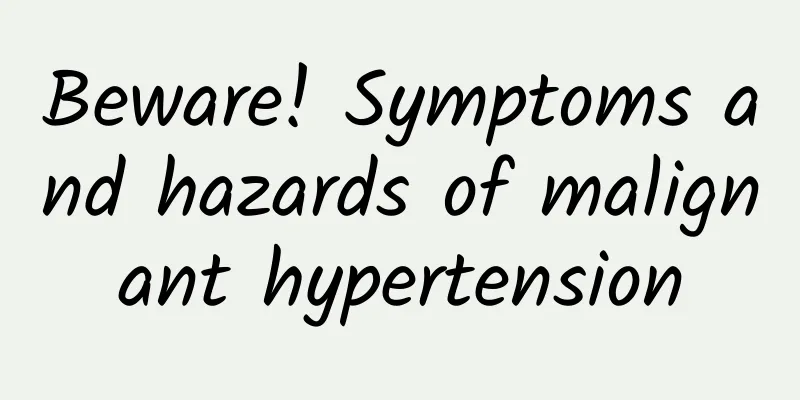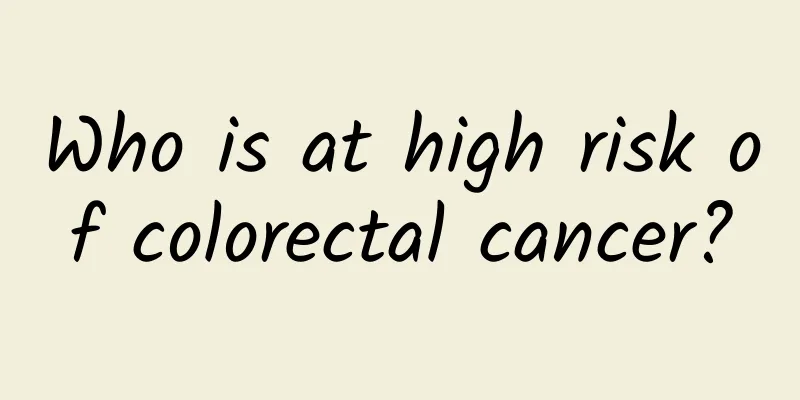Beware! Symptoms and hazards of malignant hypertension

|
Malignant hypertension refers to a sharp rise in blood pressure, with diastolic blood pressure lasting ≥130 mmHg, accompanied by headache, blurred vision, fundus hemorrhage, exudation and optic disc edema. Kidney damage is the most prominent, with symptoms such as persistent proteinuria, hematuria and renal insufficiency. It is common in young and middle-aged patients. Malignant hypertension and chronic kidney disease aggravate each other. Therefore, patients with kidney disease should avoid the occurrence of malignant hypertension, and those who have already developed malignant hypertension should actively receive treatment. When malignant hypertension occurs, the most common symptom is severe headache. Headache is a common symptom of hypertension, but if the headache is significantly worse than before or the nature of the headache changes, you should be alert to the possibility of malignant hypertension. In addition, progressive visual impairment, nausea, vomiting and other symptoms are also common symptoms of malignant hypertension. Therefore, for kidney disease patients, once the above symptoms occur, they should measure their blood pressure at home as soon as possible or go to a nearby clinic or hospital to measure their blood pressure, so as to detect abnormal blood pressure in time and receive treatment. The antihypertensive treatment of malignant hypertension is mainly through intravenous medication. It is necessary to control the blood pressure and avoid lowering the blood pressure too quickly or too drastically, so as not to induce ischemia of important organs such as the heart, brain and kidneys. If signs of ischemia of important organs appear after blood pressure reduction, the blood pressure reduction should be smaller. For kidney disease patients with malignant hypertension, not only should blood pressure be lowered in time, but also the inducement or cause of malignant hypertension should be actively sought and eliminated as much as possible to avoid the recurrence of malignant hypertension. Common inducements of malignant hypertension include fatigue, cold stimulation, excessive mental stress, acute and chronic pain, and discontinuation of antihypertensive drugs. Among patients with chronic kidney disease, hypertension is one of the common complications, and it is also very common for patients using antihypertensive drugs. Patients should not stop taking the drugs suddenly on their own. Daily control of blood pressure is the key to preventing and treating malignant hypertension. The following are some methods that can help control blood pressure: 1. Healthy diet: A low-salt, low-fat, high-fiber diet can help lower blood pressure. Reduce sodium intake and increase the intake of fruits, vegetables, and whole grains. 2. Control your weight: Being overweight or obese increases your risk of high blood pressure. Maintaining a healthy weight can be achieved through a healthy diet and adequate exercise. 3. Moderate exercise: Regular moderate aerobic exercise, such as walking, jogging, swimming, etc., can help lower blood pressure. 4. Reduce drinking and quit smoking: Excessive drinking and smoking will increase blood pressure and should be avoided or quit as much as possible. 5. Measure blood pressure regularly: Follow your doctor's advice and measure your blood pressure regularly to detect abnormal blood pressure in time. Kidney disease patients with malignant hypertension should not take it for granted that the cause is due to underlying kidney disease, but should actively seek other causes and eliminate them in a timely manner. For example, patients with malignant hypertension caused by renal artery stenosis can control their blood pressure through percutaneous renal angioplasty or surgery. Other secondary factors that cause malignant hypertension include pheochromocytoma, Cushing's syndrome, etc. Primary malignant hypertension is rare. In short, it is crucial for kidney patients to understand the symptoms and hazards of malignant hypertension and take active prevention and control measures. Timely medical treatment, following the doctor's treatment plan, and combining a healthy lifestyle will help reduce the risk of malignant hypertension, protect kidney health, and improve quality of life. |
>>: Detailed explanation in one article: Things to note during hormone use
Recommend
What to do if you have cholecystitis and bloating
Cholecystitis is a common digestive disease that ...
A pimple on the vulva hurts when touched
Many gynecological diseases can cause vulvar itch...
What should I do if my stomach bloates during menstruation?
Menstruation is an indicator of a female friend&#...
What is the cause of the watery and smelly leucorrhea?
I believe that many female friends have encounter...
What medicine can cure female cystitis quickly?
Cystitis actually refers specifically to inflamma...
What disease causes the smelly leucorrhea?
Women have leucorrhea every month. The difference...
Infertility causes and treatments
Infertility refers to the inability of a couple t...
Pulmonary embolism: the "invisible killer" hidden between breaths
When we talk about breathing, most people think o...
Treatment of Nathian gland cysts
Nathian gland cyst is a gynecological disease. Th...
Why does it itch down there at night?
I believe that many women will easily notice a ph...
How to control uterine contractions at 32 weeks of pregnancy
At the 32nd week of pregnancy, it has entered the...
What is the meaning of Clivia? What are the varieties of Clivia?
Clivia is a flower that people place great value ...
Eight exercises for women to train their abdominal muscles
Although in most people's eyes, it is a trend...
How to induce menstruation after taking birth control pills
Everyone knows that after women take contraceptiv...





![[Doctors Talk About Medicine] Aortic dissection, the hidden danger: Learn about this cardiovascular disease](/upload/images/67f1753411cb0.webp)


![[Doctors Talk About Medicine] Starting from the community: What should be done to prevent hypertension and diabetes?](/upload/images/67f17ba3cddcb.webp)
